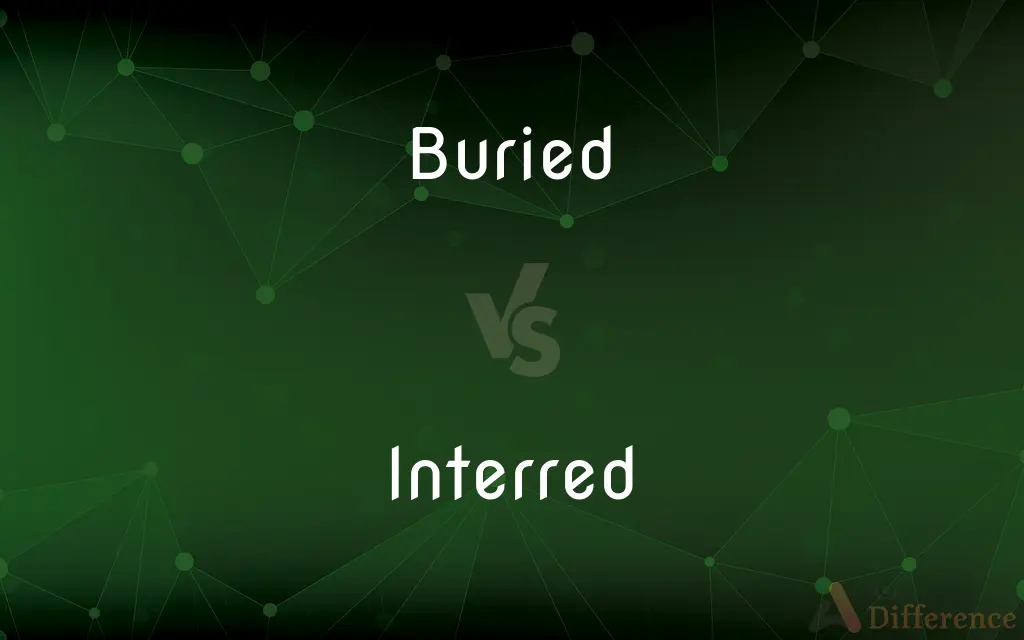Buried vs. Interred — What's the Difference?
By Tayyaba Rehman & Maham Liaqat — Updated on March 19, 2024
Buried implies placing something under the ground, while interred specifically refers to placing a body in a grave or tomb as part of a funeral rite.

Difference Between Buried and Interred
Table of Contents
ADVERTISEMENT
Key Differences
Buried generally means placing anything under the ground, covering it with soil or another substance, and can be used in various contexts, not just for the deceased. On the other hand, interred is used almost exclusively in the context of funeral rites, implying a more formal and ceremonious process of placing a body in a grave or tomb.
While burying can be a more immediate and practical act, often driven by the need to conceal or protect, interring carries with it a sense of respect and dignity, typically involving a ceremony or ritual. This distinction highlights the broader social and cultural implications of interment as opposed to the more utilitarian action of burying.
The term buried can be applied to inanimate objects, secrets, or even emotions, indicating a wide range of uses beyond the literal act of placing something under the ground. Interred, however, is specifically associated with human remains, emphasizing the ceremonial aspect of burial and the human context.
Buried can happen in a variety of settings, from a simple backyard burial of a pet to the concealment of treasure, whereas interred usually implies a designated resting place, such as a cemetery or crypt, often marked by a monument or grave marker.
Comparison Chart
Definition
Placing under the ground, covering with soil.
Formally placing a body in a grave or tomb, usually with rites.
ADVERTISEMENT
Context
Broad, includes objects, secrets, etc.
Specifically related to human remains and funeral practices.
Connotation
Practical, can be non-ceremonial.
Ceremonial, with a sense of respect and dignity.
Usage
Wide-ranging, not limited to deceased.
Almost exclusively used for human burial practices.
Setting
Can be anywhere suitable.
Typically in designated resting places like cemeteries or crypts.
Compare with Definitions
Buried
The act of placing something under the ground or covering it with soil.
The time capsule was buried in the schoolyard for future generations to find.
Interred
Formally placing a deceased person's body in a grave or tomb, usually with funeral rites.
The soldier was interred with full military honors in the national cemetery.
Buried
Concealing something, from objects to emotions.
The pirate buried his treasure on the deserted island.
Interred
Specifically related to human burial practices.
The ancient pharaohs were interred in elaborate tombs designed to protect them in the afterlife.
Buried
Can be practical or metaphorical, not necessarily ceremonial.
The hazardous waste was buried in a secure landfill.
Interred
A formal burial process, often involving a ceremony.
The family gathered to watch as their patriarch was interred beside his ancestors.
Buried
Broad applications beyond funeral contexts.
He buried his feelings of regret deep within, hoping never to face them again.
Interred
Carries a sense of respect, dignity, and adherence to cultural or religious practices.
The community interred the remains of the unknown soldiers with a solemn ceremony.
Buried
Includes burying objects, secrets, and emotions.
The old letters were buried under a pile of books, forgotten over time.
Interred
Typically takes place in designated resting places like cemeteries or crypts.
The poet was interred in a quiet corner of the city's oldest cemetery.
Buried
Placed or hidden underground
Buried treasure
Interred
To place in a grave or tomb; bury.
Buried
To place (a corpse) in a grave, a tomb, or the sea; inter.
Interred
Having been interred.
Buried
To dispose of (a corpse) ritualistically by means other than interment or cremation.
Interred
(of a buried corpse) Located.
Buried
To place in the ground; cover with earth
The dog buried the bone. The oil was buried deep under the tundra.
Interred
Simple past tense and past participle of inter
Buried
To place so as to conceal; hide or obscure
Buried her face in the pillow.
Buried the secret deep within himself.
Interred
Placed in a grave;
The hastily buried corpses
Buried
To occupy (oneself) with deep concentration; absorb
Buried myself in my studies.
Buried
To put an end to; abandon
Buried their quarrel and shook hands.
Buried
To outdo or defeat by a large margin
The team was buried in the first half by its crosstown rivals.
Buried
To make (a shot) successfully and especially forcefully.
Buried
Placed in a grave at a burial.
Buried
Concealed, hidden.
Buried
Simple past tense and past participle of bury
Buried
Covered from view; as, her face buried (or hidden) in her hands; buried in the smoke of many rifles.
Buried
Placed in a grave; as, the hastily buried corpses. Opposite of unburied.
Buried
Covered from view;
Her face buried (or hidden) in her hands
A secret buried deep within herself
Buried
Placed in a grave;
The hastily buried corpses
Common Curiosities
Can something non-living be interred?
The term interred is almost exclusively used for human remains and involves ceremonial aspects, so it's not typically used for non-living things.
What does it mean to bury something?
To bury something means to place it under the ground or cover it with soil, which can apply to objects, secrets, emotions, or the deceased.
What does it mean to inter a body?
To inter a body means to place a deceased person's remains in a grave or tomb, typically as part of a funeral rite.
What's the difference between being buried and interred?
Being buried can refer to placing anything under the ground, while being interred specifically refers to the formal act of burying a deceased person with funeral rites.
What's the difference between a coffin and a tomb?
A coffin is a container for the deceased's body, often buried or placed in a tomb, which is a more substantial structure or chamber for the deceased.
Is cremation considered a form of interment?
Cremation itself is not interment, but the ashes can be interred in various ways, such as in a columbarium or a burial plot.
Is interment a legal requirement?
Legal requirements for handling human remains vary by jurisdiction, but interment in designated areas is commonly regulated.
What happens at an interment service?
An interment service typically includes rituals or ceremonies to honor the deceased, and may involve prayers, readings, and the formal placement of the body in its resting place.
Can animals be interred?
While animals can be buried, the term interred is generally reserved for human burial practices and carries a ceremonial connotation.
Why is it important to mark where someone is interred?
Marking a grave helps in commemorating the deceased, allows for visitation by loved ones, and maintains records for historical and legal purposes.
Do all cultures inter their dead?
Many cultures have practices of interring their dead, but the specific rituals, ceremonies, and methods can vary widely.
Can you inter ashes?
Yes, the ashes of a cremated person can be interred in a columbarium, buried in a cemetery plot, or placed in a dedicated urn garden.
How do archeologists differentiate between buried and interred remains?
Archaeologists consider context, such as the presence of grave goods, orientation, and signs of ceremony, to differentiate between simple burials and formal interments.
Can interment practices affect the environment?
Yes, interment practices, especially those involving embalming chemicals and non-biodegradable materials, can have environmental impacts, leading to increasing interest in eco-friendly burial options.
Share Your Discovery

Previous Comparison
Washateria vs. Laundromat
Next Comparison
Proud vs. PridefulAuthor Spotlight
Written by
Tayyaba RehmanTayyaba Rehman is a distinguished writer, currently serving as a primary contributor to askdifference.com. As a researcher in semantics and etymology, Tayyaba's passion for the complexity of languages and their distinctions has found a perfect home on the platform. Tayyaba delves into the intricacies of language, distinguishing between commonly confused words and phrases, thereby providing clarity for readers worldwide.
Co-written by
Maham Liaqat














































